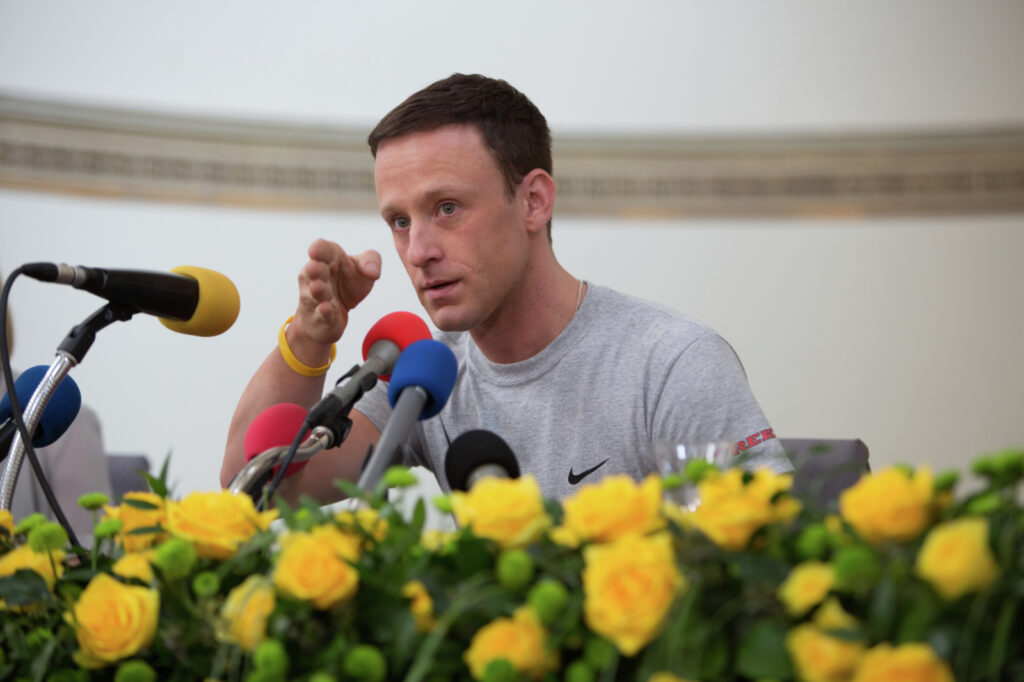A sure sign that festival fatigue has set in? When you watch a movie about sports doping and wish that there were performance-enhancing drugs available for those who race around this 11-day movie marathon.
At least “The Program,” an expose about disgraced cycling god Lance Armstrong, whooshes by at a brisk 102 minutes. For the record, I support any soundtrack that utilizes the Ramones’ bouncy “Blitzkrieg Bop,” used here to underscore the sight of a buzzing swarm of bike-racing athletes as they curve and swerve through a mountain pass.
This is one restless biopic, which prefers to make its points in choppy sound bites with the hard-charging slick aesthetics of a Nike commercial as it leads to the notorious Oprah confession in 2013. No rest stops here as the film commences not with the Texas-born Armstrong as a kid atop a tricycle or anything as trite as that. Instead, we are plopped into the early ‘90s as Armstrong attempts his first European race and soon learns about better winning through chemistry from the so-called Italian pope of dope, physician and coach Michele Ferrari (this Dr. Frankenstein to Armstrong’s man-made monster radiates an amusing devil-may-care insouciance courtesy of French actor Guillaume Canet).
Ben Foster, an actor of bulldoggish intensity, has the take-no-prisoners look and built-for-speed body to emulate Armstrong both physically and mentally as a competitor, but the film never allows him to relax enough to reveal much more than his need to be No.1. While at TIFF, Foster admitted in an interview with “The Guardian” that he actually doped for the role, but it might have been better if he had consumed some nuance-inducing meds instead.
When Armstrong meets his first wife along the way to legend status, they barely share a howdy-do before saying, “I do” seconds later. Armstrong’s onetime fiancée Sheryl Crow is mentioned, along with other celeb pals as Robin Williams and Dave Letterman, but we are denied seeing them as a couple. Whatever gossip is mentioned only relates to his drug regimen and cover-ups. Perhaps this no-time-to-think blur of an editing technique is a metaphor for how quickly its subject soared to the top of his game and how few questioned the physical impossibility of what he had achieved.
The script, written by John Hodge (“Trainspotting”) and based on the book “Seven Deadly Sins: My Pursuit of Lance Armstrong” by Irish sportswriter David Walsh for England’s “The Sunday Times,” assumes the shape of detective yarn of sorts. Imagine Javert tracking Jean Valjean if Javert was the good guy. Walsh is brought to life by comic actor Chris O’Dowd, who serves as the voice of reason, but also of resentment, as his fellow sports journos refuse to follow his lead in probing the facts behind Armstrong’s incredible Tour de France streak of seven wins from 1999 to 2005.
While the montage-heavy movie never flags, it also rarely enlightens. Anyone alive in the past two decades has soaked up most of the headline-grabbing info if not directly then simply by osmosis via the media. The most revelatory scenes are those involving Armstrong’s struggles after being diagnosed with testicular cancer in 1996 at age 25 when he actually confessed to a doctor about his doping.
As a survivor, he decides to reach out to others in the same situation by creating what would become his Livestrong Foundation with its ubiquitous yellow rubber wristbands. He is shown unselfishly visiting patients, including a young boy who can only summon enough energy to gaze upon his hero. Perhaps this icon does have a heart. But once he has beaten the disease, Armstrong simply increases his resolve to use whatever outlawed methods he can in order to win, including using other riders on his team to make it easier for him to be in the spotlight. And, as someone notes in the film, his status as a cancer survivor and philanthropic spokesperson is a convenient shield for any criticism. Thus, St. Lance is born.
The most potentially interesting character is Armstrong’s teammate Floyd Landis, raised a Mennonite in Pennsylvania (apparently, riding a bike for fun is a no-no). He is an impressionable acolyte whose conscience causes him to spill the beans. Jesse Plemons, whose expressive mug is also put to good use in “Black Mass,” stands in for the many who fell under Armstrong’s sway – except he took a stand. Dustin Hoffman also flashes by a couple times, but you will barely notice.
British director Stephen Frears, a director of works of uncommon scope but also varying degrees of quality, last visited TIFF in 2013 with the later Oscar-nominated “Philomena,” the true account of elderly Irish woman (Judi Dench) who decides to search for the son she gave up for adoption long ago. That, too, had a scandal, one involving baby-selling nuns. Interestingly enough, the script was also based on a book by a reporter, played by comedian Steve Coogan. But while “Philomena” was a heartfelt road trip of the highest order, “The Program” is a soulless exercise in stylishness.












